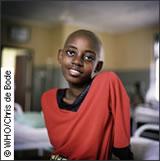Dr Sambo urges Africans to intensify cancer prevention and control measures
Brazzaville, 4 February 2010 -- Africans have been advised to adopt healthy behaviours and lifestyles that reduce the risk of getting cancers, and to undergo early screening and treat-ment for cancer and precancerous lesions.
This advice was given today by WHO Regional Director for Africa, Dr Luis G. Sambo, in his message to mark World Cancer Day, observed worldwide on 4 February.
In the message, Dr Sambo called for greater public awareness about cancer, and made a spe-cial plea for immunizing African children against cancer – causing viral infections such as Hepatitis B and Human Papilloma Virus infections, in order to prevent the occurrence of cancer later in life.
The Regional Director extended his appeal for action against cancer to global stakeholders saying: “I call on international agencies and donors to tailor their aid and development assistance to improve funding and technical support for cancer prevention and control programmes (in the African Region).”
The theme of this year’s World Cancer Day -- ”Cancer can be prevented too” –underscores the importance of protecting individuals and communities against cancer risk factors such as tobacco use, unhealthy diet, physical inactivity, overweight and infections that cause cancer.
Tobacco use, which accounts for 30 per cent of cancer-related deaths in the world, is the most preventable cause of cancer known to man. A further 40 per cent of cancers are related to unhealthy diet, physical inactivity and their associated obesity conditions. Harmful use of alcohol is another risk factor, as are a host of environmental exposures and some genetic dispositions.
“The burden of cancer is not just a burden of grief, it also undermines society’s prospect for growth, prosperity and hope”, Dr Sambo said, disclosing that in 2008, 667,000 cancer cases and 518,000 cancer-related deaths were recorded in the African Region where underlying chronic infections account for 26 per cent of risk factors.
In men, the commonest forms of cancer are Kaposi’s sarcoma and cancers of the liver and prostrate gland; in women, cancers of the cervix and breast and Kaposi’s sarcoma are com-monest.
Most cancers can be prevented by adopting healthy lifestyles such as cessation of tobacco use, avoiding the harmful use of alcohol, undertaking physical activity and adopting a health diet rich in fruit and vegetables. Experts say that preventive measures are doubly beneficial as they can also contribute to preventing other chronic diseases that share the same risk factor.
Dr Sambo stressed that “What is needed (now) is urgent action. Millions of lives could be saved each year if old attitudes and myths about cancer care dealt with, prevention and con-trol measures stepped up, and more people get access to available new technologies and ef-fective treatments”.
According to the 2008 World Cancer Report, the cancer situation worldwide is worsening as patients remain unscreened and undiagnosed or inadequately treated. The report projects that new cancer cases will rise globally from 13 million to 27 million annually by 2030, kill-ing 17 million people every year.
Dr Sambo pledged that WHO would continue to work collaboratively with countries and partners to support Member States in strengthening their health workforce and facilities with a view to enhancing their cancer prevention and control efforts.
For more information, please contact:
Dr Jean-Marie DANGOU
Medical Officer/Cancer, WHO/AFRO
Brazzaville
Tel: +47 241 39344
E-mail: dangouj [at] afro.who.int (dangouj[at]afro[dot]who[dot]int)
Samuel T. Ajibola (media contact)
Tel: + 47 241 39378
E-mail: ajibolas [at] afro.who.int (ajibolas[at]afro[dot]who[dot]int)



